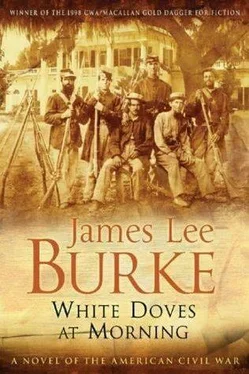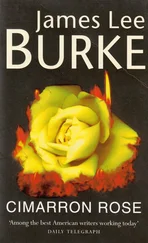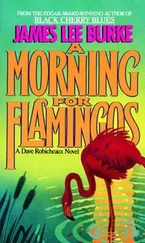In spite of his invitation she had made no movement to sit down at the table with him, which would have caused her to violate a protocol that was on a level with looking a white person directly in the face. But after having shown her obedience to a plantation code that systematically degraded her as well as others, she realized she was now, of her own volition, invading the privacy and perhaps exposing the weakness of a man she genuinely admired and was fond of.
For just a moment she wondered if it was true, as white people always said, that slaves behaved morally only when they were afraid.
"I try not to study on it," Willie replied. Then, as though to distract himself from his own thoughts, he told her of his father's participation in the Texas Revolution, the massacre of prisoners at Goliad, the intercession of a camp follower who probably saved his father's life.
"A prostitute saved all them men from being killed?" she said.
"She surely did. No one ever learned her name or what became of her. The Texans called her the Angel of Goliad. But think of the difference one poor woman made," he said.
She sat down on her bed, her knees close together, her hands folded in her lap.
"I ain't meant to be prying or rude. You're always kind to the niggers, Mr. Willie. You don't belong with them others," she said.
"Don't call your people niggers," he said.
"It's the only name we got," she said, with a sharpness in her voice that surprised her. "You gonna let the Yankees kill you so men like Marse Jamison can make more money off their cotton? You gonna let them do that to you, suh?"
"I think I should go now. Here, I brought you a book of poems. They're by an English poet named William Blake." He rose from his chair and offered her the book.
But she wasn't listening now. Her gaze was fixed outside the door. Through the crisscross of wash lines and steam drifting off the wash pots scattered throughout the yard, she saw Rufus Atkins rein his carriage, one with a surrey on top, and dismount and tether his horse to an iron weight attached to a leather strap he let slide through his fingers.
"You best go, Mr. Willie," she said.
"Has Mr. Rufus been bothering you, Flower?"
"I ain't said that."
"Mr. Rufus is a coward. His kind always are. If he hurts you, you tell me about it, you hear?"
"What you gonna do, suh? What you gonna do?" she said.
He started to speak, then crimped his lips together and was silent.
AFTER he was gone she sat by herself in the cabin, her heart beating, her breasts rising and falling in the silence. Out of the corner of her eye she saw Rufus Atkins' silhouette break across the light.
He stepped inside the cabin, his wide-brimmed hat on his head, his gaze sweeping over the room, the taut bedspread on her mattress, the jug of lemonade on her table, the cut flowers in the water jar.
He removed a twenty-dollar gold piece from his watch pocket and flipped it in the air with his thumb, catching it in his palm. He rolled it across the tops of his knuckles and made it disappear from his hand. Then he reached behind her ear and held the coin in her face.
"Deception's an art, Flower. We all practice it. But white people are a whole sight better at it than y'all are," he said.
When she didn't reply, he smiled wanly. "Young Willie bring you his wash?" he asked.
"Yes, suh," she replied.
"I hope he wasn't here to get anything else washed," he said.
She lowered her eyes to the floor. Atkins sat down at the table and removed his hat and wiped his face with a handkerchief.
"Flower, you are the best-looking black woman I've ever seen. Honest to God truth," he said. He picked up the jug of lemonade and drank out of it.
But when he set the jug down his gaze lighted on an object that was wedged under her mattress pad. He rose from the chair and walked to her bed.
"I declare, a dictionary and a poetry book and what looks like a tablet somebody's been writing in. Willie Burke give you these?" he said.
"A preacher traveling through. He ax me to hold them for him," she said.
"That was mighty thoughtful of you." He folded back a page of her tablet and read from it. "'A cricket sleeped on the pillow by my head.' This preacher doesn't sound like he's got good sense. Well, let's just take these troublesome presences off your hands."
He walked outside and knelt by a fire burning under a black pot filled with boiling clothes. He began ripping the pages out of her writing tablet and feeding them individually into the flames. He rested one haunch on the heel of his boot and watched each page blacken in the center, then curl around the edges, his long hair and clipped beard flecked with gray, like pieces of ash, his skin as dark and grained as scorched brick.
Then he opened the book of poems and wet an index finger and methodically turned the pages, puckering his lips as he glanced over each poem, an amused light in his face.
"Come back inside, Marse Rufus," she said from the doorway.
"I thought you might say that," he replied, rising to his feet, his stomach as flat and hard as a board under his tucked shirt and tightly buttoned pants.
AT four-thirty the next morning, April 12, 1861, a Confederate general whose hair was brushed into a greased curlicue on his pate gave the order to a coastal battery to fire on a fort that was barely visible out in the harbor. The shell arced across the sky under a blanket of stars, its fuse sparking like a lighted cigar tossed carelessly into a pile of oily rags.
BY AFTERNOON of the same day the telegraph had carried the news of the bombardment of Fort Sumter to New Iberia, and Camp Pratt, out on Spanish Lake, was suddenly filled with young men who stood in long lines before the enlistment tables, most of them Acadian boys who spoke no English and had never been farther from Bayou Teche than the next parish. The sky was blue through the canopy of oak trees that covered the camp, the lake beaten with sunlight, the four-o'clocks blooming in the shade, the plank tables in front of the freshly carpentered barracks groaning with platters of sausage, roast chickens, boudin, smoked ducks, crab gumbo, dirty rice, and fruit pies that had been brought in carriages by ladies who lived in the most elegant plantation homes along the bayou.
Willie's tall friend, Jim Stubbefield, sat barefoot in his militia uniform, his back against a cypress tree by the water's edge, and drank from a cup of buttermilk and looked with puzzlement at the festive atmosphere in the camp. He turned to a young man in civilian clothes sitting next to him and said, "Robert, I think the fates are not working properly here. I enlisted two months ago and no one seemed to notice."
His friend was named Robert Perry. His hair grew over his collar and was the color of mahogany, his face handsome, his blue eyes never troubled by fear or self-doubt or conflict with the world around him.
"I'm sure it was just an oversight on the community's part," he said.
Jim continued to stare in a bemused way at the enlistment lines, then his gaze locked on one individual in particular and he chewed on a piece of skin on his thumb and spit it off his tongue.
"I think I've made a mistake," he said.
"A man with your clarity of vision? Seems unlikely," Robert said.
"Look there. Willie's joining up. Maybe at my urging."
"Good for Willie," Robert said.
"I doubt Willie has it in him to shoot anyone," Jim said.
"Do you?"
"If they come down here, I figure they've asked for it."
"I doubt if it was easy for Willie to come here. Don't rob him of his self-respect," Robert said, rising to his feet, pressing a palm down on Jim's shoulder.
"Your father owns over a hundred and eighty niggers, Robert. You ought not to be lecturing to the rest of us."
Читать дальше












